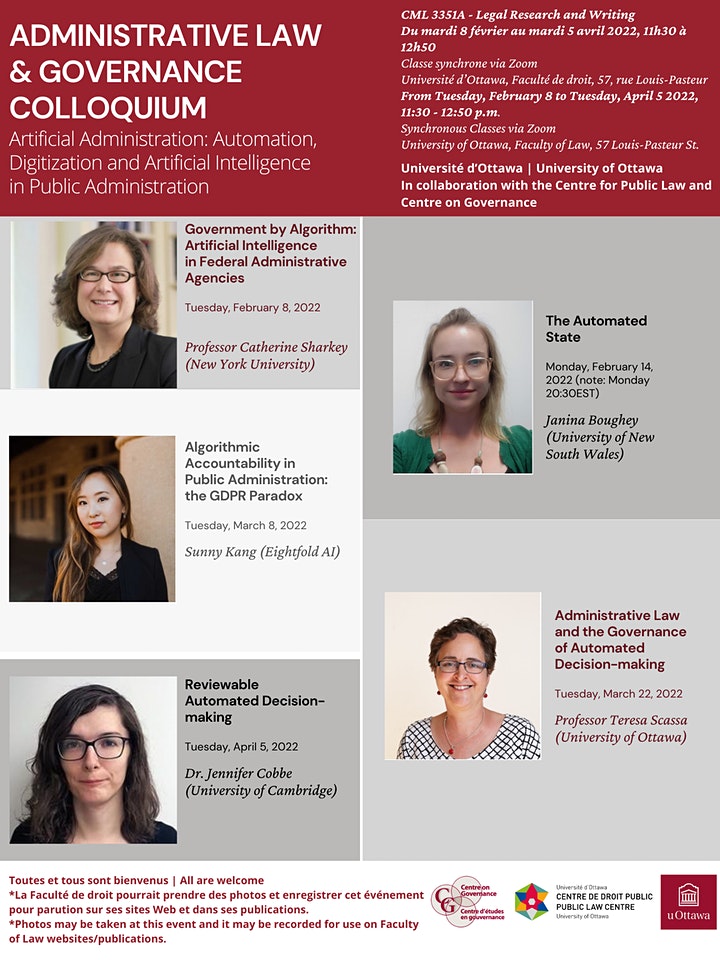2022 Administrative Law & Governance Colloquium — Artificial Administration: Automation, Digitization and Artificial Intelligence in Public Administration

The topic of the 2022 Administrative Law & Governance Colloquium will be “Artificial Administration: Automation, Digitization and Artificial Intelligence in Public Administration”:
In the era of Big Data, governments and public entities are turning more and more to automation, digitization and machine learning to operate more effectively and efficiently. The extent of technological change in and on public administration is difficult to quantify, but concern has grown about the use of cutting-edge algorithms and forms of artificial intelligence to support governmental operations. There have been high-profile examples of maladministration causing interference with privacy interests or the unlawful withdrawal of benefits. States have responded by developing regulatory frameworks, such as the General Data Protection Regulation in the European Union and the Directive on Automated Decision-Making in Canada. Are these frameworks sufficiently robust to cabin automated decision-making, digitization and use of machine learning? Do we need new accountability mechanisms to deal with rapid technological evolution in the machinery of government? And what role for judicial review, as the rise of a “culture of justification” in administrative law and the expansion of the “duty of fairness” impose strict requirements of justification, intelligibility and transparency which machines might not be able to meet? Speakers from Australia, Canada, the United Kingdom and the United States will reflect on these questions and others during the 2022 Colloquium.
The line-up of speakers is:
- Dr Janina Boughey (University of New South Wales) and Katie Miller (AUSTRAC)
- Dr Jennifer Cobbe (University of Cambridge)
- Dr Sunny Kang (Eightfold AI)
- Professor Teresa Scassa (University of Ottawa)
- Professor Catherine Sharkey (New York University)
Dates and registration details will follow in the Fall (update: now available here). I expect the Colloquium will be held remotely again in 2022.
Here is some background information about the Colloquium.
The Administrative Law & Governance Colloquium is a series of seminars with world-leading experts on public law, who will discuss their scholarship in depth in sessions chaired by Professor Paul Daly, the University Research Chair in Administrative Law & Governance. Attendance is open to students, faculty members and invitees from the public and private sector.
The Colloquium’s Directed Research Project can be taken for 3 credits by uOttawa JD students. Students are expected to attend the series of seminars (save where written permission has been obtained in advance) and to produce a paper of 7,500 to 10,000 words based on the Colloquium theme.
As a project-based research and writing course, students’ work will be independent and self-directed. In collaboration with the speakers, Professor Daly will provide a detailed reading list in advance of each seminar. A general reading list will also be made available. Professor Daly will meet with enrolled students twice, on an individual basis: once at the beginning of the Winter Term to discuss the student’s proposed project and once in the middle of the Winter Term to discuss the student’s progress. These individualized supervisions, along with knowledge acquired from prior study, the general reading list, the detailed reading lists and seminar attendance, will equip students to produce their papers.
The final grade will have a participation component of 10%, based exclusively on in-person attendance at the seminars (or written permission, obtained in advance, to be absent).
Registration in this course is by application. Students interested in enrolling should email Professor Daly (paul.daly@uottawa.ca) with (a) a brief statement of a proposed project; (b) a CV; and (c) an up-to-date law school transcript (official or unofficial). The deadline is January 31, 2022. Enrollment is likely to be capped at 10 students. Students must have taken, or be enrolled in for Winter 2022, Administrative Law
This content has been updated on January 6, 2023 at 19:42.